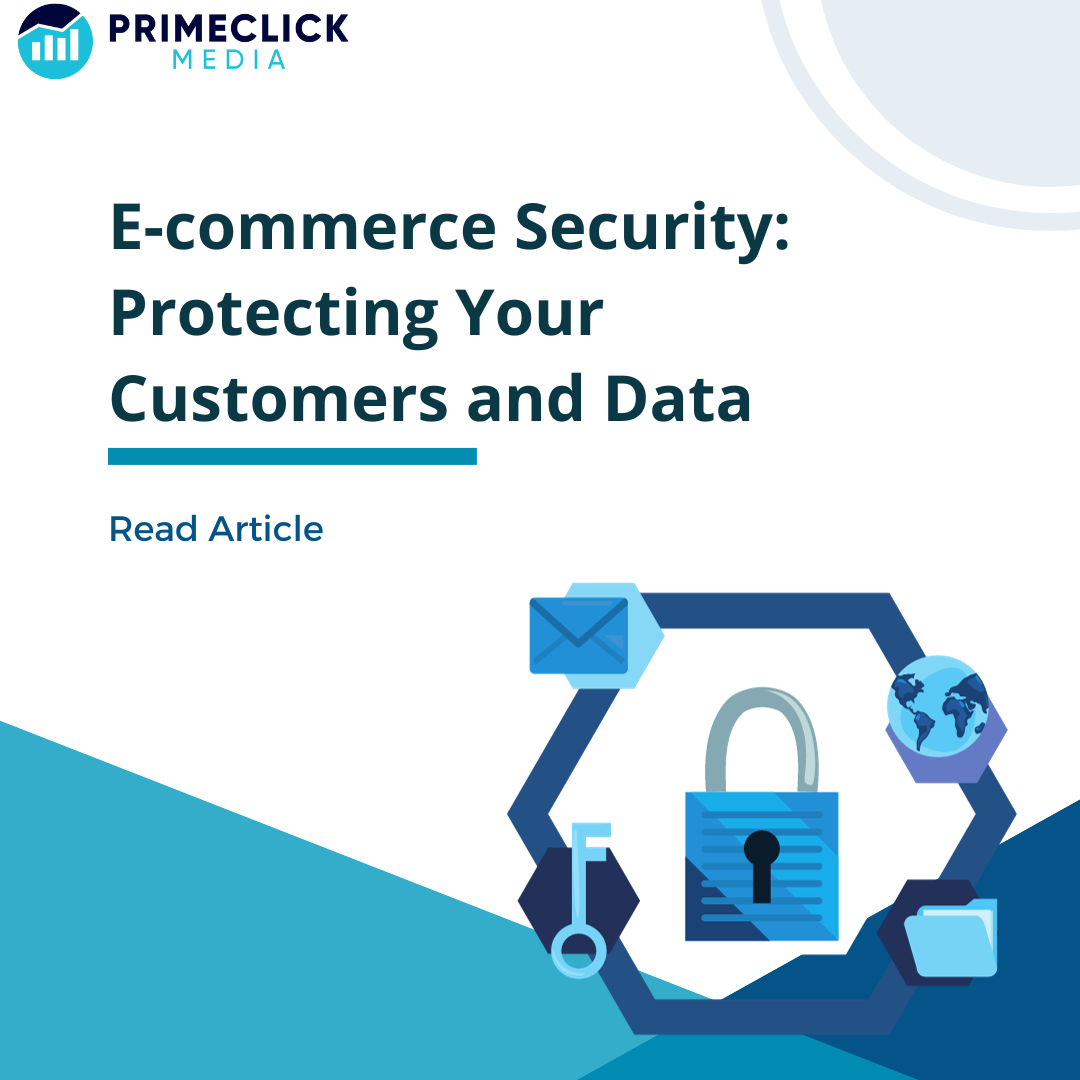In the world of online shopping, keeping things safe and secure is super important. Just like you lock your front door to keep your home safe, e-commerce businesses need to lock up their digital doors to protect customers and data. Let’s dive into how e-commerce security works and why it’s crucial.
Why E-commerce Security Matters
E-commerce security matters a lot because it’s like a protective shield for both customers and businesses in the world of online shopping. Think about it this way: just as you wouldn’t leave your front door wide open, you wouldn’t want to leave your digital doors unlocked either. Here’s why e-commerce security is a big deal:
1. Personal Information Protection
When you shop online, you share sensitive information like your name, address, and credit card details. E-commerce security ensures that this information doesn’t fall into the wrong hands. It’s like having a guard that makes sure only authorized people can access your private info.
2. Preventing Data Breaches
Hackers are like modern-day pirates who want to steal your treasure – in this case, your personal and financial data. E-commerce security measures act as a fortress, making it difficult for hackers to break in and cause havoc.
3. Building Trust
Imagine walking into a store that looks run down and sketchy. You’d probably hesitate to shop there, right? The same goes for online stores. When a website has solid security measures in place, it builds trust with customers. People feel confident that their information is safe, and they’re more likely to make purchases.
4. Financial Safety
Online transactions involve money changing hands. E-commerce security ensures that when you pay for a product or service online, your payment details remain confidential. This shields you from potential financial theft and fraudulent activities.
5. Business Reputation
For e-commerce businesses, a data breach can be a nightmare. It can damage their reputation and lead to legal issues. By prioritizing security, businesses show that they care about their customer’s safety, which can enhance their reputation.
6. Legal and Regulatory Compliance
Many places have laws about how customer data should be handled and protected. E-commerce security helps businesses comply with these regulations, preventing hefty fines and penalties.
7. Cyber Attacks Prevention
Cyber attacks are like digital burglaries. E-commerce security systems act as virtual locks and alarms, deterring cyber criminals from attempting to steal valuable information.
8. Smooth Shopping Experience
Ever been to a website that’s slow or glitchy? E-commerce security measures can improve the speed and performance of online stores. When customers have a smooth shopping experience, they’re more likely to return.
9. Protection from Malware
Malware is malicious software designed to harm your computer or steal your data. E-commerce security helps block malware from infecting your devices while you shop online.
10. Global Reach with Confidence
You can shop online from any location in the world. Strong security measures give you the confidence to explore international stores, knowing that your information is in safe hands.
Risk Factors of an Unsecured E-commerce Platform
Bad e-commerce security can lead to a range of serious issues that can affect both customers and businesses. Here are some of the problems that can arise when e-commerce security isn’t up to par:
- Data Breaches: Weak security can result in unauthorized access to customer data, including personal information and payment details. This can lead to identity theft, financial fraud, and other malicious activities.
- Financial Loss: Customers who fall victim to data breaches may face financial losses due to unauthorized transactions made using their stolen payment information. Businesses could also incur financial losses due to legal actions, compensations, and damage to reputation.
- Identity Theft: Personal information stolen from e-commerce sites can be used to impersonate individuals, open fraudulent accounts, and conduct illegal activities in their names.
- Customer Trust Erosion: A breach of customer data erodes trust. Customers may feel betrayed and choose to stop doing business with a company that failed to protect their sensitive information.
- Reputation Damage: Businesses with poor security measures may suffer reputational damage, resulting in decreased customer loyalty, negative reviews, and loss of market share.
- Legal Consequences: Many regions have laws and regulations that require businesses to safeguard customer data. Failing to meet these standards can result in legal actions, fines, and penalties.
- Business Downtime: Cyberattacks or security breaches can lead to system downtime and disruptions in e-commerce operations. This translates to lost sales, frustrated customers, and decreased productivity.
- Customer Service Strain: Dealing with the aftermath of a security breach can put a strain on customer service teams. They’ll have to handle inquiries, complaints, and concerns from affected customers.
- Decreased Conversion Rates: When customers hear about security breaches on an e-commerce site, they might hesitate to make purchases. This can lead to lower conversion rates and decreased revenue.
- Intellectual Property Theft: Businesses that store intellectual property, such as proprietary software code or innovative product designs, may face theft of these assets if their security measures are inadequate.
- Malware Distribution: Bad security can expose websites to malware attacks. If customers visit a compromised site, their devices could become infected, leading to further issues.
- Loss of Competitive Advantage: Businesses that don’t prioritize security might lose their competitive edge. Customers are more likely to choose businesses that value their security and privacy.
- Difficulty Recovering: Recovering from a security breach can be costly and time-consuming. Businesses may need to invest in better security measures, undergo audits, and rebuild customer trust.
Tips for Staying Secure
Staying secure while shopping online is important to protect your personal and financial information. Here are some tips to help you shop safely in the e-commerce world:
- Use Strong Passwords: Create unique passwords that are a mix of letters, numbers, and symbols. Useless information like names or birthdays should be avoided.
- Enable Two-Factor Authentication (2FA): Any time 2FA is an option, enable it. Requiring a second form of verification in addition to your password, such as a code delivered to your phone, offers an additional layer of protection.
- Shop on Trusted Websites: Stick to well-known and reputable online stores. Be cautious if you come across websites that seem unfamiliar or offer deals that sound too good to be true.
- Check for “https” in the URL: Before entering any personal or payment information, make sure the website’s URL starts with “https” instead of just “HTTP.” The “s” indicates a secure connection.
- Look for the Padlock Icon: Check for a padlock icon in the address bar. This indicates that the website has a valid SSL certificate, which means your data is encrypted and safe.
- Be Cautious with Email Links: Avoid clicking on links in emails that ask for your personal or financial information. Instead, go directly to the website by typing the URL in the address bar.
- Don’t Overshare Personal Information: Legitimate online stores usually don’t ask for unnecessary personal information. Be cautious if a website asks for information like your Social Security number or unnecessary personal details.
- Regularly Update Your Software: Keep your computer, smartphone, and browser updated with the latest security patches and updates. These updates often include fixes for known security vulnerabilities.
- Use Secure Payment Methods: Opt for secure payment methods like credit cards or digital wallets, which often have fraud protection. Avoid using debit cards directly, as they may not offer the same level of protection.
- Keep an Eye on Your Accounts: Regularly review your bank and credit card statements for any unauthorized transactions. If you spot anything unusual, report it immediately.
- Avoid Public Wi-Fi for Transactions: Using public Wi-Fi networks for online shopping can be risky. If you need to make a transaction, consider using a secure network or a VPN (Virtual Private Network) for added protection.
- Be Wary of Phishing Scams: Be cautious of emails, messages, or pop-ups that ask for personal information or urge you to click on links. If in doubt, contact the company directly through their official website or phone number.
- Educate Yourself: Stay informed about common online scams and tactics that hackers use to trick people into revealing their information. Knowing more will improve your ability to defend yourself.
By following these tips, you can shop online with confidence, knowing that you’re taking steps to safeguard your personal and financial information from potential threats.
In Conclusion
E-commerce security is like a superhero team that keeps your online shopping safe from sneaky hackers. They use encryption, firewalls, and SSL certificates to protect your info and make sure your digital shopping experience is smooth and secure. So next time you’re scrolling through an online store, know that digital heroes are working hard to keep your info locked up tight!





